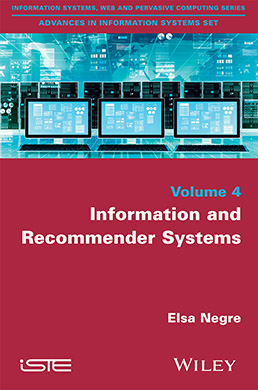
The Advances in Information Systems set goes into more depth on the new forms of information systems, which are becoming, along with digital systems, the true nervous system of any organization.
A piece of information is an element of knowledge that can be kept, processed or communicated. It is linked to the concepts of communication, data, knowledge and representation.
In the context of the constant increase in the amount of information, it is difficult to know what data to look for and where to find it. Information techniques exist to facilitate this search and enable the relevant extraction of information.
One of these techniques is the recommendation process which guides the user during his exploration by searching for information that seems to be relevant to him. It concerns a particular form of filtering which aims to present information elements (films, music, books, images, websites, etc.) that may be of interest to the user.
Recommendation Systems introduces the concepts inherent to recommendation, based, amongst others, on information retrieval, information filtering, machine learning, and collaborative approaches. It also discusses the evaluation of such systems and presents different cases of application.
1. A Few Important Details Before We Begin.
2. Recommender Systems.
3. Key Concepts, Useful Measures and Techniques.
4. Practical Implementations.
5. Evaluating the Quality of Recommender Systems.
Elsa Negre has a Ph.D. in Computer Science and is an Associate Professor at Paris-Dauphine University in France. She is particularly interested in decision-support systems, recommender systems, smart cities and crisis management.